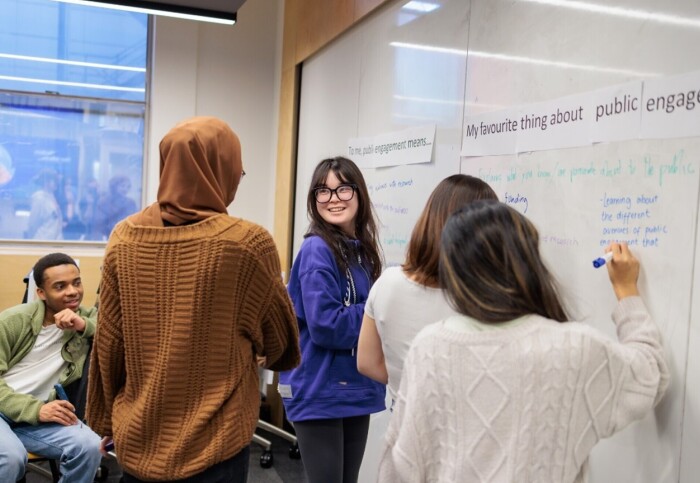Students explore high-quality engagement practice in Public Engagement Module

14 second-year undergraduate students have recently completed their public engagement module as part of Imperial I-Explore STEMM.
Students from a range of departments spent their Spring Term learning and practicing how to effectively engage public audiences with research and why doing so is important.
Public engagement describes the myriad of ways in which the public can get involved with the activity, benefits, and research of an institution. This might include a science festival, a talk or performance at a Lates event, school workshop or a discussion with a patient group.
Through this interactive module, students discovered what makes high-quality public engagement and applied this knowledge in evaluating, planning and developing their own enjoyable, meaningful and inclusive engagement activities.
I-Explore student Rosanne Choong recommends this module because “you learn to communicate scientific research in ways that the public can understand. This not only can motivate the public to learn more about STEM but ultimately it can motivate researchers to learn from the public too. Public engagement is mutually beneficial.” Rosanne added, “I really enjoyed this module because sessions were engaging, and it was done in a very friendly environment where all our ideas were considered.”
Students first explored the benefits of public engagement within the higher education context and the importance of targeting engagement to specific audiences. Students met Societal Engagement team members, discovered the breadth of engagement carried out by Imperial and familiarised themselves with key engagement concepts such as Science Capital. They then had the opportunity to apply this knowledge in practice during a visit to the Science Museum and by observing first-hand a public engagement event of their choice. These experiences equipped students with the ability to assess what matters in effective public engagement, a key skill for future STEM professionals.
Students then focused on developing engagement activities tailored to families living locally to the White City campus with the aim to communicate specific Imperial College research (the Wellhome study). Students followed a highly collaborative, iterative process to develop their activities: brainstorming, presenting ideas, receiving feedback from Wellhome study researchers and Community Engagement team members, refining ideas accordingly, prototyping, assessing risks. Students were supported through a series of practical workshops such as using storytelling as a tool for STEM engagement. By developing and planning their own activities students developed communication, collaboration and creativity skills, and had a lot of fun too!
Students on the Public Engagement module get realistic, real-world public engagement experience. Andy Ridgeway
External Examiner and Senior Lecturer in Science Communication at the University of the West of England Andy Ridgeway said, "Students on the Public Engagement module get realistic, real-world public engagement experience by presenting activities they develop … I particularly like the integral role that the public engagement team plays in the module, allowing students to learn from those with expertise who are not academics - something that is relatively rare in academic institutions."
The module concluded with students reflecting specifically on their own learnings from the module and more broadly on public engagement as a route for societal impact. Following the module, students reported that they plan to get more involved with public engagement organised at Imperial, such as volunteering at Late events and the Great Exhibition Road festival, participating in Family Programming in our White City campus), or even to initiate public engagement within their fields of study.
Engagement Coordinator Maria Serveta says, “Having a positive impact in society through STEM starts with well-rounded STEM professionals. Imperial College London recognises this and offers this unique undergraduate module to set aspiring STEM professionals on a pathway to value public engagement practice and see it as part of their academic identity.”
I-Explore modules are part of the Centre for Languages, Culture & Communication's flagship programme for undergraduates. They offer a wide range of modules to stimulate personal, professional and intellectual growth across the first, second and third year of study.
Year 1 students – if you would like to take part in the Public Engagement module in 2024-25, please note the module selection period finishes on 29th May.
Article text (excluding photos or graphics) © Imperial College London.
Photos and graphics subject to third party copyright used with permission or © Imperial College London.
Reporter
Maria Serveta
Office of the Provost


